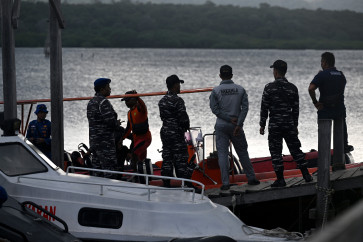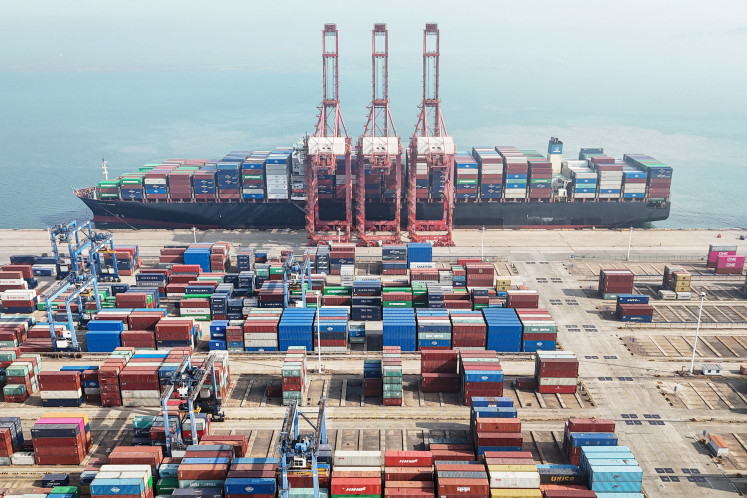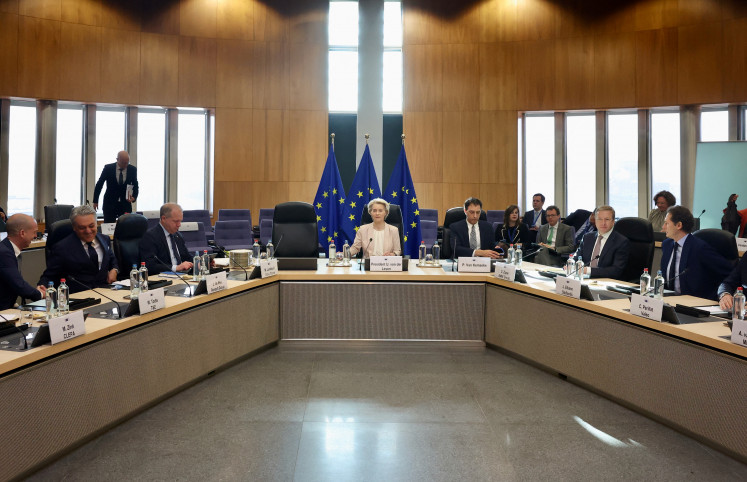Popular Reads
Top Results
Can't find what you're looking for?
View all search resultsPopular Reads
Top Results
Can't find what you're looking for?
View all search resultsMore foreign companies provide digital training
More foreign companies are taking the initiative to provide digital training programs to Indonesian workers to address literacy and skillset gaps in the country
Change text size
Gift Premium Articles
to Anyone
M
ore foreign companies are taking the initiative to provide digital training programs to Indonesian workers to address literacy and skillset gaps in the country.
The latest initiative is being made by global payments and technology company Mastercard, which has just opened a training program called Mastercard Academy 2.0 in cooperation with two non-profit organizations, namely the YCAB Foundation and Infra Digital Foundation.
Technology companies such as United States tech giants Google, Facebook, Apple and Amazon, as well as China’s Alibaba and Huawei, have already provided digital training programs in the country.
Mastercard’s training program, officially launched on Monday, is to teach up to 100,000 Indonesians, including schoolchildren, young adults, entrepreneurs, and mid-career professionals, by 2022 about digital knowledge such as cybersecurity and payment technology.
The training program would consist of four subprograms spanning different age segments, such as a cybersecurity certification program for about 6,000 vocational high schools (SMK) students, a cybersecurity toolkit program for 30,000 small and medium business owners, Girls4Tech, which is designed for 60,000 young girls to gain knowledge about payment technology, and an expert speaker series program for 4,500 policymakers and mid-career professionals to learn about industry innovations.
“We want to be a partner for the Indonesian government in human capital development. The stronger economy will result in more inclusive growth and more people with financial security. This is good for business in the long run,” Mastercard’s vice chairman and president for strategic growth, Michael Froman, said after the launch of the training program.
Indonesia’s digital economy is well on track to dominate Southeast Asia with its market value expected to more than triple to US$130 billion by 2025 from $40 billion in 2019, according to a study conducted by Google, Singaporean holding company Temasek and management consulting firm Bain & Company.
Mastercard’s copresident for the Asia-Pacific region, Ari Sarker, said that Indonesia was “extremely important” in ASEAN as the country accounted for one-third of the ASEAN economy, which is estimated to have been worth $2.7 trillion in 2017.
He said Indonesia would continue to dominate the ASEAN economies, which were projected to further increase in value to $6 trillion in the coming decade.
“We believe that in the coming decade, Indonesia will continue to remain a third of the ASEAN economy so it is extremely attractive,” Sarker said. “It is an opportunity for Mastercard to help build this country with the latest technology capabilities, which will not only transform our presence but also have a much wider impact in society.”
Sarker said Mastercard had allocated a larger part of its investment to cybersecurity and other digital sectors in partnership with local companies.
A 2019 study by the National Encryption Agency (BSSN) found that Indonesia was hit by a record of 12.9 million cyberattacks in 2018 with an average 15 percent growth per year, signifying the rise of cyberattacks in the world’s fourth most populous nation.
A McKinsey & Company report entitled Automation and the Future of Work in Indonesia found that 23 million jobs could be displaced by automation by 2030, but 27 million to 46 million new jobs could be created in the same period if Indonesians learn new skills.
The Finance Ministry, meanwhile, is in the process of formulating regulations for the implementation of tax deductions for research and development (R&D) programs under which companies are allowed to cut their taxable income by up to 300 percent of the cost of their R&D activities.
The government has set several priorities for developing the country’s digital economy, namely by formulating a data protection bill, combating cyberattacks and enhancing the telecommunications and information industry, said Communications and Information Minister Johnny G. Plate.
“We need to close the digital gap by providing 600,000 digital talents every year,” said the minister during the launch of Mastercard’s program, calling for more companies to conduct similar programs.










